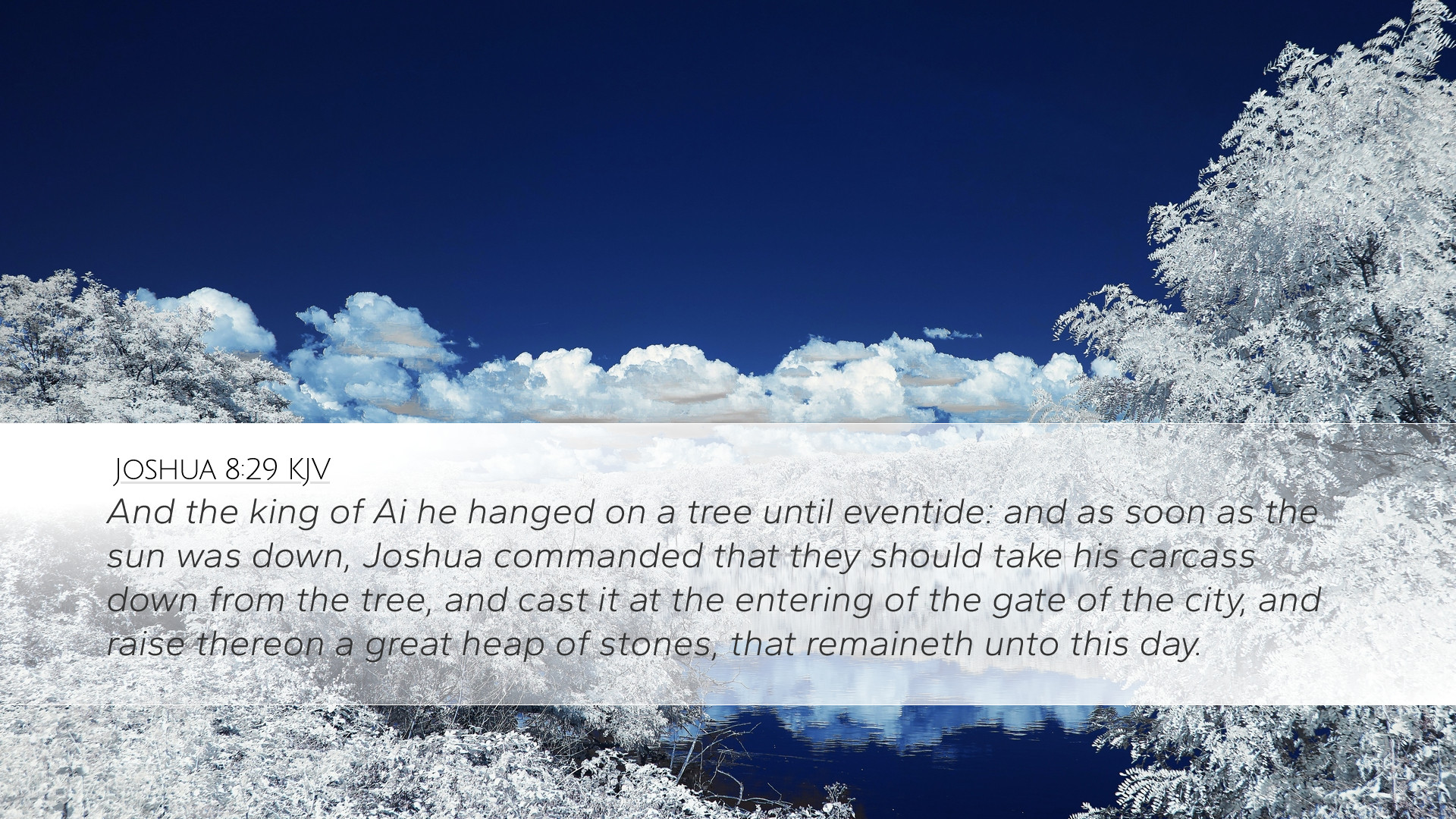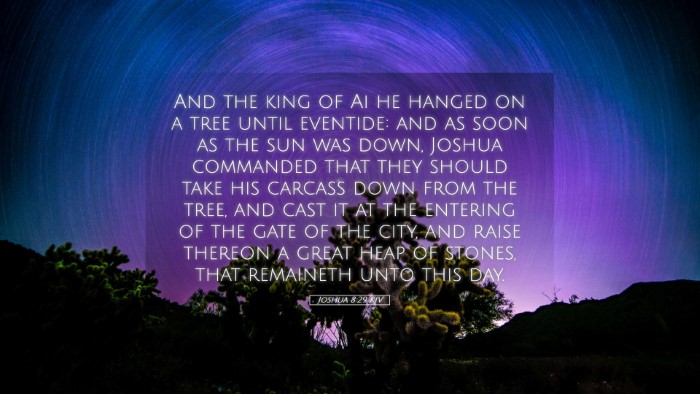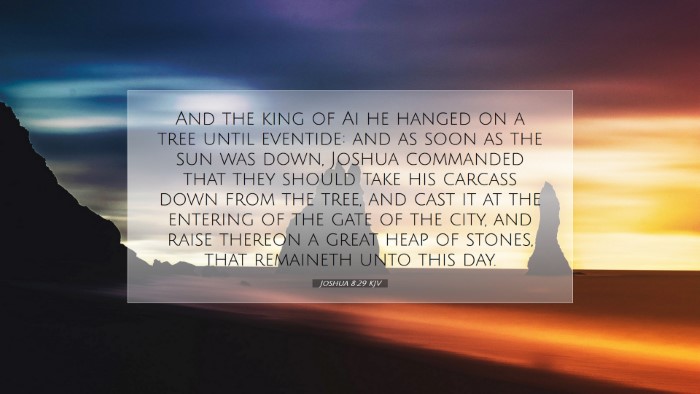Commentary on Joshua 8:29
Verse: "And the king of Ai he hanged on a tree until evening; and as soon as the sun was down, Joshua commanded that they should take his carcass down from the tree and cast it at the entering of the gate of the city, and raise there a great heap of stones, that remaineth unto this day."
Introduction
This verse concludes the narrative surrounding the conquest of Ai, illustrating the severe judgment upon the city and its ruler. Joshua's command serves as both a warning and a demonstration of God's justice. This analysis draws from prominent public domain commentaries to provide insights relevant for pastors, students, theologians, and Bible scholars.
Contextual Background
The event recorded in Joshua 8 represents a critical moment in Israel's conquest of Canaan. Following the initial disaster at Ai due to Achan's sin, Israel is now victorious due to obedience to God's directives. This passage emphasizes the consequences of rebellion against divine authority while underlining the seriousness of sin as demonstrated through the fate of the king of Ai.
Matthew Henry's Insights
According to Matthew Henry, the hanging of the king of Ai signifies a profound act of disgrace and a mark of divine disfavor. He notes that the manner of execution reflects the punishment that awaits every adversary of God’s covenant people. The act is not solely punitive but also serves a pedagogical role, impressing upon the Israelites the severity of rebellion and the importance of obedience to God's laws.
Albert Barnes' Commentary
Albert Barnes elaborates on the legal and cultural implications of hanging a criminal. He points out that the king's execution and display serve as a warning to the surrounding nations. The act demonstrates the futility of opposing God and His people, reinforcing the sacredness of the land promised to Israel. Barnes also highlights the ritual significance of burying the king’s body outside the city, aligning with Deuteronomic laws that prevent displaying a body overnight, signifying a purification process and divine justice.
Adam Clarke's Observations
Adam Clarke provides a detailed analysis of the implications of the heap of stones mentioned in the verse. He interprets this as a physical memorial to the king's judgment, serving as a lasting admonition to Israel regarding the consequences of sin. Clarke notes that the great heap of stones remains as a testament to God's judgment, reinforcing the notion that the land belongs to the righteous and the consequences await those who rebel against divine command.
Theological Implications
The theological themes in Joshua 8:29 are profound. First, the execution of the king not only signifies judgment but also reflects God’s covenantal faithfulness to Israel. It emphasizes the principle of justice as an integral part of God's character. The securing of the land for Israel is explicitly connected to obedience; thus, the fate of Ai and its king serves a dual purpose of warning and instruction.
Justice and Judgment
In this passage, the king's execution acts as a narrative device that illustrates the justice of God. The fate of Ai's king serves as a stark reminder of the consequences of opposing God's will. This theme resonates throughout Scripture, wherein divine justice is regularly presented alongside mercy, prompting believers to reflect on their own actions and the repercussions that follow disobedience.
Obedience to God
Joshua's directives reflect a core principle of leadership in God's eyes: fidelity to divine instruction. His commands following the defeat at Ai show a radical commitment to God’s orders which ultimately led to Israel's victory. For pastors and theologians, this exemplifies the necessity of steadfast adherence to God’s word and prompts ongoing reflection on the implications of collective and individual obedience in the contemporary church.
Practical Applications
The narrative in Joshua 8:29 serves multiple applications for modern believers. It teaches about the importance of following God's guidance, the nature of His justice, and the consequences of sin. For leaders within the church, it reinforces the idea that moral and spiritual accountability is paramount in guiding a community of faith.
For Church Leaders
- Leadership Integrity: Church leaders must uphold integrity and accountability, mirroring Joshua’s unwavering commitment to God’s commandments.
- Communicating Consequences: It's essential to communicate the seriousness of sin and the reality of divine justice in teachings.
- Covenantal Faithfulness: Leaders should emphasize the importance of remaining faithful to God's covenant, guiding their congregations to a deeper understanding of obedience.
For Individual Believers
- Personal Accountability: Each believer is reminded of personal responsibility before God and the consequences of disobedience.
- Spiritual Reflection: This passage encourages self-examination concerning one’s walk with God and adherence to His statutes.
- Community Engagement: Believers are called to actively engage in their communities, reflecting God's justice and mercy in their actions.
Conclusion
Joshua 8:29 encapsulates key themes in the biblical narrative of God’s justice, the seriousness of sin, and the importance of obedience. Through the insights of historical commentators, we uncover the rich theological implications of this passage, serving as vital reminders for those who lead and engage within the faith community. The memorial of stones stands not only as a historical marker but also as a continuing exhortation to remain faithful to God amidst the challenges of life.


